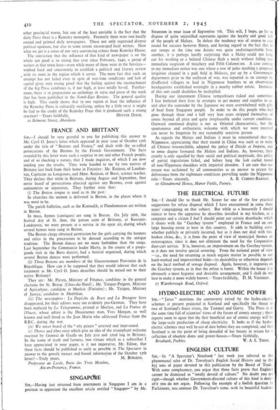FRANCE AND BRITTANY
Sta,—I should be very grateful to you for publishing this answer to Mr. Cyril 0. Jones's letter which appeared in your issue of October 12th under the title of " Bretons and France," and dealt with the so-called persecutions of the Bretons by the French Government. The facts revealed by this letter were such a surprise to me and other French people, and of so shocking a nature, that I made inquiries, of which I am now sending you the results. They were handed to me by two natives of Brittany just back from their home in Finistere: Mr. Kerjean, of Landun- vez, Capitaine au Longcours, and Mme. Kerjean, of Brest, science teacher. They declare that while in Brittany, during August and September, they never heard of persecutions directed against any Bretons, even against autonomists or separatists. They further state that : (i) The Breton tongue is used as in the past : In churches the sermon is delivered in Breton, in the places where it was wont to be.
The parish bulletins, such as the Kannadik, at Plondamezean are written in Breton.
In mass, hymns (cantiques) are sung in Breton. On July 26th, the festival day of St. Ann, the patron saint of Brittany, at Kersaint- Landunvez, we were present at a service in the open air, during which several hymns were sung in Breton.
The Breton clergy obtained permission for the girls carrying the banners and relics in the processions to be dressed according to the antique tradition. The Breton dances are no more forbidden than the songs. Last September the Communist leader Marty, in the course of a propa- ganda visit in the Brest district, had a festival organised, during which several Breton dances were performed.
(ii) Three Bretons are members of the Gouvernement Provisoire de la Republique. How can it be supposed that they would tolerate that such treatment as Mr. Cyril 0. Jones describes should be meted out to their native Brittany?
They are: Mr. Pleven, Minister of Finance, candidate in the general elections for St. Brieuc (Cotes-du-Nord) ; Mr. Tanguy-Pregent, Minister of Agriculture, candidate at Morlaix (Finistere) ; Mr. Teitgen, Minister of Justice, candidate in Morbihan.
(iii) The newspapers : La Depeche de Brest and La Bretagne have disappeared, for their editors were too evidently pro-German. They have been replaced by Le Telegramme, printed at Morlaix, and La France de l'Ouest, whose editor is the Douarnenez man, Yves Morgan, so well known and well loved as the Jean Mann who addressed France from the B.B.C. during the war.
(iv) We never heard of the "163 priests " arrested and imprisoned.
(v) Photos and films exist which give an idea of the triumphant welcome received by General de Gaulle on July 21st and 22nd lass in Brittany. In the name of truth and fairness, two virtues which as a subscriber I have appreciated in your paper, is it not imperative, Mr. Editor, that these facts should be published as early as possible in The Spectator in answer to the grossly inexact and biased information of the October 12th letter?—Truly yours, M. BURGESS. Professeur an Lycie, Butte des Trois Moulins, Aix-en-Provence, France.






























 Previous page
Previous page